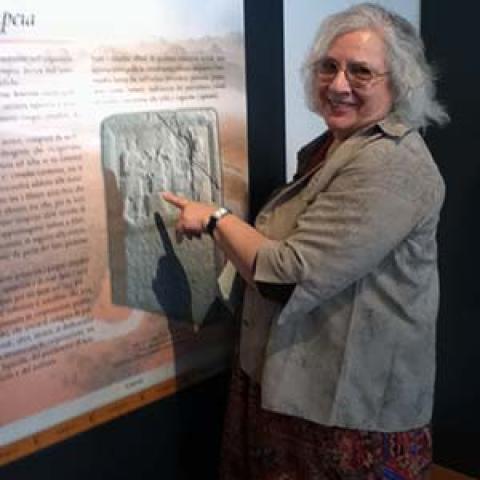Professor Emerita of History

Biography
Dr. Hall has written the definitive history of Roman Beirut which from the time of Augustus to Justinian was a center of the study of Roman law. Her book presents a full portrait of the city--its economy, religious transformation from pagan to Christian, and the population's occupations as artisans, merchants and legal experts. She also has researched the neighboring city of Tyre, the importance of the emperor Septimius Severus, and the social evidence of legal texts, like the Theodosian Code. Dr. Hall's other major research area focuses on the conversion of the Emperor Constantine as evidenced in 4th century texts ranging from the writings of Eusebius and a figural poet named Publilius Optatianus Porfyrius.
Areas of Research Specialization
- History of Roman Beirut and Roman law
- Constantine and Christianization
- Translation of Late Ancient Latin texts
Areas of Teaching Specialization
- Roman history
- History of Late Antiquity and Byzantium
- Ancient Greek History
Education
-
B.A. in Ancient Languages at College of William and Mary, 1964
-
M.A. in History at University of South Florida, 1990
-
Ph.D. in History at The Ohio State University, 1996
Spotlight
- Roman Berytus
Roman Berytus: Beirut in Late Antiquity. London and New York: Routledge, 2004; paperback and Kindle, 2008.
- Article on the Theodosian Code
“Clyde Pharr, the Women of Vanderbilt, and the Wyoming Judge: The Story behind the Translation of the Theodosian Code in Mid-Century America,” Roman Legal Tradition 8 (2012): 1-42,
- Conversion of Constantine
“Cicero’s Instinctu Divino and Constantine’s Instinctu Divinitatis: The Evidence of the Arch of Constantine for the Senatorial View of the ‘Vision’ of Constantine,” Journal of Early Christian Studies 6:4 (1998) 647-671.
http://muse.jhu.edu/journals/journal_of_early_christian_studies/v006/6…
- Forthcoming publication
Hall, Linda Jones. The Poems of Optatian: Puzzling out the Past in the Time of Constantine the Great. London and New York: Bloomsbury Academic, 2024.
Publilius Optatianus Porfyrius (Optatian) was sent into exile by Constantine sometime after the Emperor’s ascent to power in Rome in 312 AD. Hoping to receive pardon, Optatian sent a gift of probably twenty design poems to Constantine around the time of the ruler’s twentieth anniversary (325/326 AD). These poems, his accompanying letters, and poems to other recipients are published here with translations and a detailed commentary that examines Optatian, his period and his work.
To enable the reader to experience the multiple messages of the poems, the Latin text is presented near the English translation with any related design close by. Some poems, laid out on a grid of up to 35 letters across and down, have an interwoven poem marking key letters in the primary poem, thereby revealing a highlighted image. Some designs include the Chi-Rho or numerals created from V’s and X’s to mark imperial anniversaries. Other (previously unrecognised) designs seem to
represent senatorial, imperial, military or bureaucratic motifs or to derive from coin images. Shape poems representing a water organ, an altar and a panpipe reveal their relevance immediately. The introduction and commentary elucidate literary allusions from over 100 authors (lines from Vergil, Ovid, Lucan, Silius Italicus, Statius, and lesser-known writers abound) and mythological references, mostly to the Muses and Apollo.Optatian’s prestige as an official in both Greece and Rome is well attested - these poems mark Optatian as a fascinating writer of his time, holding onto the classical past while acknowledging Christian symbolism.
